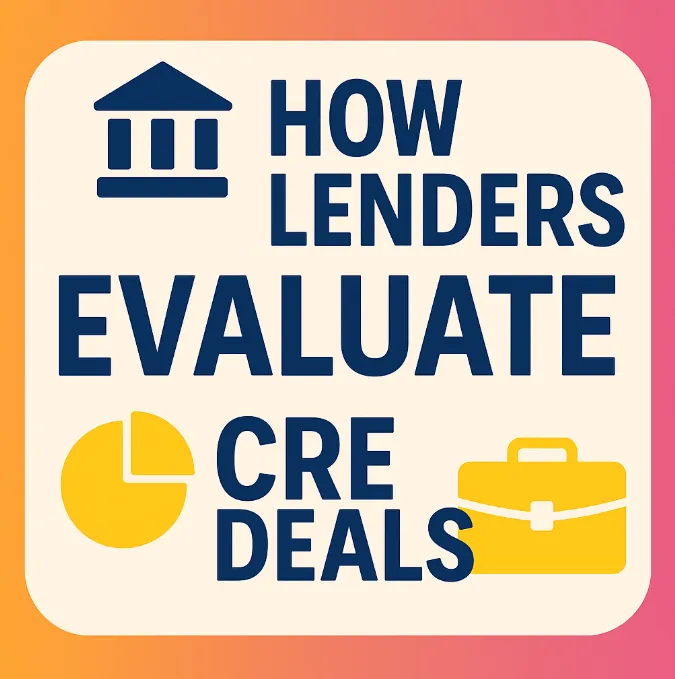
📊 How Lenders Evaluate Commercial Real Estate Deals 💼 | Top CRE Loan Tips
📊 How Lenders Evaluate Commercial Real Estate Deals 💼 | Top CRE Loan Tips
🏦 Inside the Mind of a Lender: How CRE Financing Decisions Are Made 🤔
🏦 How Lenders Evaluate CRE Deals: What Every Investor Should Know
When you apply for a commercial real estate (CRE) loan, lenders don’t just glance at your credit score and greenlight the deal. Instead, they dive deep into the property’s income potential, your financial profile, and overall deal structure.
In this guide, we’ll break down how lenders evaluate CRE deals and what you can do to increase your chances of approval—whether you're acquiring retail, office, multifamily, or industrial property.
🔍 Key Factors Lenders Analyze:
1. Debt Service Coverage Ratio (DSCR)
The DSCR is the gold standard for commercial lending. It measures a property’s cash flow relative to its debt payments. Most lenders look for a DSCR of at least 1.25x, meaning the property generates 25% more income than its debt obligation.
Formula:
Net Operating Income (NOI) ÷ Annual Debt Service
2. Loan-to-Value Ratio (LTV)
LTV compares the loan amount to the property’s appraised value. Most commercial lenders max out around 70-75% LTV. The lower your LTV, the less risk the lender perceives—and the better your terms.
3. Borrower Strength
This includes your:
· Personal credit score
· Net worth
· Liquidity
· CRE experience
· Global cash flow (especially on full-recourse loans)
If the deal gets shaky, lenders want confidence you can step in.
4. Property Type & Location
Multifamily and industrial properties often receive favorable treatment. Specialized asset classes like hotels or restaurants may face tighter scrutiny unless backed by strong sponsors. Location in a stable or growing market, like Katy or Fulshear, TX, can significantly improve lender confidence.
5. Lease Profile or Rent Roll
For income-producing properties, lenders will evaluate:
· Lease terms and expiration dates
· Tenant quality and diversification
· Vacancy rates
· Market rent comparisons
6. Exit Strategy
Lenders want to know how they’ll get paid back. Will you refinance in 5 years? Sell to a 1031 exchange buyer? Your strategy must align with the loan’s term and risk profile.
🧠 Tips to Improve Financing Odds:
· Present a clean pro forma with conservative income and expenses.
· Disclose all debts, assets, and contingencies.
· Work with a broker who can match you with the right lender.
· Consider bridge or SBA loans if you don’t meet conventional criteria.
Whether you’re a first-time buyer or a seasoned investor, understanding a lender’s mindset will help you package stronger deals and secure better terms. Ready to discuss your next acquisition or refinance? Let’s talk.
https://www.houstonrealestatebrokerage.com/
https://www.houstonrealestatebrokerage.com/houston-cre-navigator
https://www.commercialexchange.com/agent/653bf5593e3a3e1dcec275a6
http://expressoffers.com/[email protected]
https://app.bullpenre.com/profile/1742476177701x437444415125976000
https://author.billrapponline.com/
https://www.amazon.com/dp/B0F32Z5BH2
© 2023-2024 Bill Rapp, Broker Associate, eXp Commercial Viking Enterprise Team
